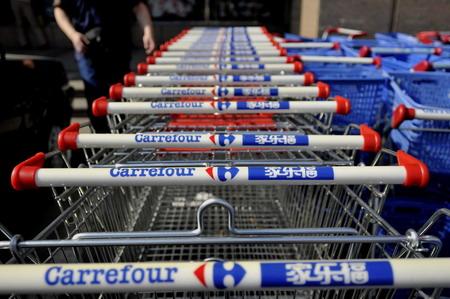
A row of Carrefour shopping trolleys at the entrance to a Beijing outlet of the French retailer. [XU YIN / CHINA FOTO PTESS]
Retailer embarks on strategic expansion on the back of high salesIt's 1 am one day during this year's Spring Festival and hundreds of consumers are on a shopping spree, waiting in long queues, trolleys piled high with goods, at Carrefour's Tiantongyuan outlet in the Changping district of northern Beijing.
The night time craze was symbolic of the retail giant's strong performance in China. Claudio Gouveia, vice-president of Carrefour China and also general manager of the North Territory of Carrefour China, said the country has become one of the most significant and also fastest-growing markets for the retailer.
Carrefour last year pulled out of Russia and southern Italy amid the economic meltdown following decisions to quit Japanese, South Korean and Mexican markets in 2005 and 2006, because of "unsmooth operations". It sold its stores to local enterprises.
However, the retailer maintained steady expansion in China. Gouveia said that Carrefour opened 22 new stores in 2009, boosting the total number of outlets to 157 across the country. It plans to open 20 to 25 new outlets this year.
He added that the company was satisfied and very optimistic about its business in China because the country's household consumption rates have been high.
In the past year, Carrefour benefited a lot from the stimulus measures, introduced by the Chinese government. For example, the authorities subsidized energy-saving household appliances in an effort to encourage their purchase.
Gouveia said Carrefour had a very clear strategic plan for the Chinese market and would be focusing on constructing hypermarkets with an average size from 6,000 sq m to 11,000 sq m.
The company was making great efforts to balance its presence in big cities and also second and third tier cities. It has been operating its retail business in 45 cities across China.
"Currently, Carrefour has a good presence in big cities while more new stores will be in second and third tier cities," said Gouveia.
The French company will be the first international retailer to enter the Inner Mongolia autonomous region, where it plans to build a new outlet in 2011.
The retailer plans to develop its China-based outlets alongside the construction of local infrastructure and arrival of new businesses. "For instance, there will be a new airport in the Daxing district of Beijing's southern suburb and there may be a new outlet nearby. I believe we have many opportunities in this area," said Gouveia.
In response to its rival Wal-Mart, which is planning to build about 50 new stores each year, adding to its current total of 160 outlets, Gouveia said the focus of Carrefour was to keep a good balance between the rhythm of expansion and the quality of the stores.
"Each new store will have energy-saving programs which are expected to save 20 to 25 percent of energy compared with traditional stores," he said.
At the same time, existing outlets will undergo a 15 percent reduction in energy consumption after renovations and reconstructions.
"Retail is a daily battle. Just having bigger or more stores does not guarantee good results," said Gouveia, "For example, a customer who buys a bad loaf of bread would not return for the same product, so we have to monitor closely every detail of the products and service."
Carrefour also always keeps in touch with Chinese consumers to understand what they like and what they need. Every outlet will adjust its layout correspondingly every week and special events will be held and more space will be given for specialized products at certain times, he added.
Gouveia said the company paid much attention to store space, which helps greatly in improving the efficiency of the store and also boosts sales.
Commenting on Carrefour's expansion mode in China, Gouveia said they had a very clear business model that involved every store ranging from 6,000 sq m to 11,000 sq m having 400 to 1,000 parking places and be near a shopping mall with 30 to 60 outlets, along with restaurants, hairdressers, laundries and other useful services.
The company is also committed to introducing more international brands.
"China is a very open market because the Chinese government allows all retailers to compete and lets customers decide where to go," said Gouveia. "The major way to compete is to be the best in class every day."





